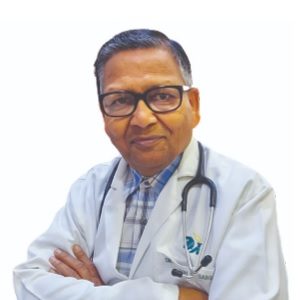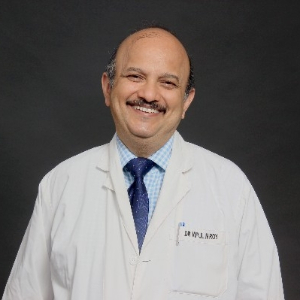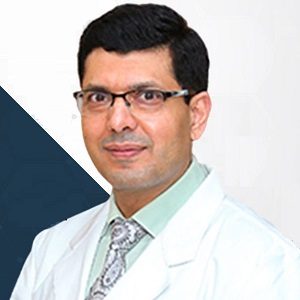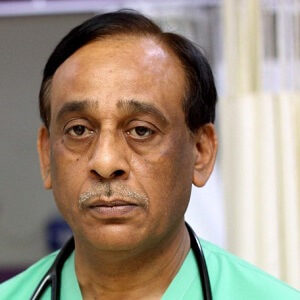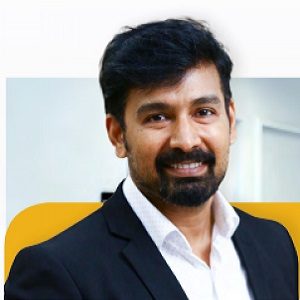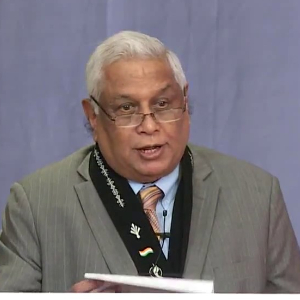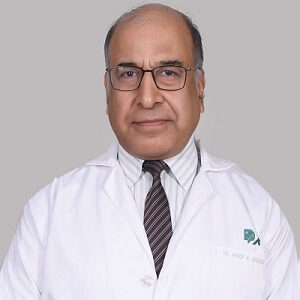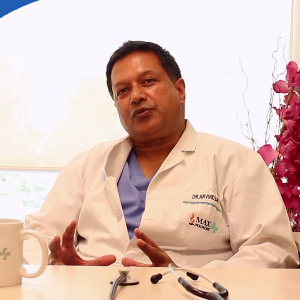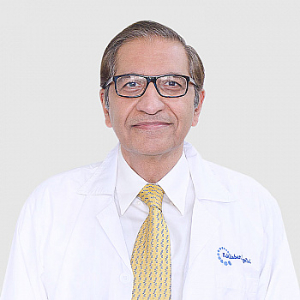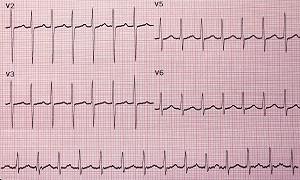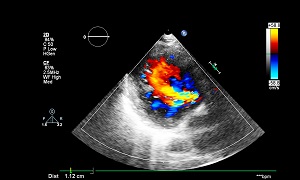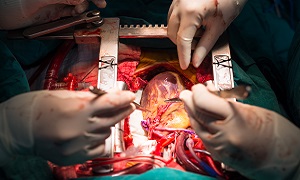Best Doctors in India for Pericardial Effusion Treatment
- Interventional Cardiologist, New Delhi, India
- Over 53 years experience
Profile Highlights:
- Dr. Mahesh Chandra Garg is an Interventional cardiologist working at Indraprastha Apollo Hospital in New Delhi with experience of over five decades in the field. He has an interest in Cardiovascular Intervention and Imaging.
- Dr. Garg has specialized in Enhanced External Counterpulsation, Chest Pain Therapies, Diabetic Cardiovascular complexities, and Coronary Artery Bypass Graft Surgery.
- He achieved excellence in invasive cardiology as a result of his participation in specialized training programs and conferences. Dr. Garg provides valuable care for his patients while also encouraging them to adopt a healthy lifestyle.
- He delivered presentations at numerous conferences and published papers in well-known national and international medical journals.
- Interventional Cardiologist, New Delhi, India
- Over 30 years’ experience
Profile Highlights:
- Dr. Vipul Roy is one of the best practicing Cardiologists in India, currently associated with the Indraprastha Apollo Hospital in New Delhi.
- After completing his MD, Dr. Roy travelled to UK where he spent eight years in Liverpool at Regional Adult Cardiothoracic Center.
- In 1994, he came back to India and joined Interventional Cardiology at Escorts Heart Institute in New Delhi as a consultant.
- Pediatric Cardiologist, New Delhi, India
- Over 26 years’ experience
Profile Highlights:
- Dr. Ashutosh Marwah is one of the best child heart specialists in India, having experience of over 26 years.
- He was the former Assistant Director of Jaypee Hospital and is now practicing at Indraprastha Apollo Hospital in New Delhi.
- Dr. Ashutosh Marwah has expertise in treating complex cardiac defects, Interventional & perioperative cardiac catheterizations, dilatation stenting, fetal echocardiography, Aortic Aneurysm, and Stent implantation.
- He has Fellowships in Pediatric Cardiology from reputed hospitals like Escorts Heart Institute, Delhi, and Royal Children’s Hospital, Melbourne, improvised his skills.
- Dr. Marwah published multiple research papers and articles in reputed medical journals of India and abroad. He is also a member of the Lions Club of Dar Es Salaam.
- Interventional Cardiologist, New Delhi, India
- Over 36 years experience
Profile Highlights:
- Dr. K K Saxena is one of the top cardiologists in India, having nearly 36 years of experience in this field.
- He is a senior consultant for interventional cardiology at Indraprastha Apollo Hospital in New Delhi.
- Dr. Saxena diagnoses and treats cardiovascular problems in kids and adults. He is specialized in balloon dilation of the mitral and pulmonary valves, the renal and peripheral arteries, and aortic coarctation.
- Dr. Saxena and his team performed several cardiac catheterizations and pacemaker implantations.
- Prior to joining Apollo hospital, Dr. K K Saxena worked at many national and international hospitals.
- He also completed research in interventional cardiology at the Royal Adelaide Hospital, Australia.
- Paediatric Cardiologist, Chennai, India
- Over 10 years’ experience
Profile Highlights:
- Dr. Muthukumaran C S is one of the finest Heart Specialists in India. He has successfully operated on more than 2500 cardiac catheterizations in children, 1000 AD closures, 250 VSD closures, and 700 PDA closures.
- The Medical practitioner has been associated with various reputed hospitals in India. Dr. Muthukumaran C S has been associated with many hospitals over the course of his illustrious and experienced career.
- Interventional Cardiologist, Mumbai, India
- Over 40 years’ experience
Profile Highlights:
- Dr. Samuel Mathew is famously known as the Father of Angioplasty in India for being the first to introduce the procedure in the country.
- He is a renowned interventional cardiologist and brought in several innovative techniques of angioplasty with coronary Stenting, Carotid Stenting, Percutaneous Bypass, Rotablator Atherectomy, and other such procedures.
- Dr. Mathew holds over 4 decades of experience in interventional cardiology and has performed more than 10,000 angioplasties till date. He also holds the credit for more than 3000 Intra Coronary Stenting and 800 Rotablation cases.
- Cardiothoracic Surgeon and Vascular Surgeon, New Delhi, India
- Over 42 years’ experience
Profile Highlights:
- Dr. Anoop K Ganjoo is one of the best cardiologists & cardiothoracic surgeons in India with a total experience of 42 years.
- Dr. Ganjoo has a rich experience of over two decades in several complicated procedures, like Mitral valve repair and replacement, Peripheral and Coronary angiography & angioplasty, vascular surgery, ICD, diffuse coronary artery disease, Pacemaker, Radiofrequency ablation of arrhythmias, adult Cardiothoracic Surgery, CRT implantation, Balloon valvuloplasty, and PDA device closure.
- Interventional Cardiologist, New Delhi, India
- Over 24 years’ experience
Profile Highlights:
- Dr. Arvind Das is an interventional cardiologist with expertise in all kinds of coronary and non-coronary interventions and electrophysiology.
- Dr. Arvind Das received his fellowship training in pacing and electrophysiology from the renowned Royal Melbourne Hospital in Australia. He has undergone training at Semelweiss Heart Centre, Budapest for Device Implantation.
- Dr. Arvind Das has years of knowledge and experience in various cardiac procedures and provides the best diagnostic and therapeutic treatment for all types of heart diseases and disorders.
- Interventional Cardiologist, Mumbai, India
- Over 45 years’ experience
Profile Highlights:
- Dr. Jamshed Dalal is a well-known Interventional Cardiologist who has over 45+ years of experience and specializes in Adult Interventional Cardiology.
- Dr. Jamshed Dalal is a highly recommended cardiologist for Angiography and performed his first coronary angiography in the year 1978 in UK.
- He specializes in various kinds of coronary and peripheral cardiac procedures and carries immense expertise in Angioplasty, intravascular ultrasound, Pacemaker Implantation, and FFR.
- Interventional Cardiologist, Chennai, India
- Over 22 years’ experience
Profile Highlights:
- Dr. Rakesh P Gopal is an Interventional Cardiologist who has done outstanding work in Interventions for Valvular Heart Disease, Mitral, Aortic, Pulmonary Balloon Valvotomy, and Initiation for Trans Aortic Valve replacement.
- He is the editor of the book Cardiovascular Interventional Trials Update, published by Mathew Foundation and Asia Pacific Interventional Cardiology India Educational Trust.
- Dr. Gopal is a firm believer in the No Re-use idea of disposable materials in interventional procedures.
Best Hospitals in India for Pericardial Effusion Treatment
Paras Hospital, Gurugram
- City: Gurugram, India
Hospital Highlights:
- Paras hospital was established in 2006 and is the 250 bedded flagship hospital of Paras Healthcare.
- The is supported by a team of doctors of international and national repute.
- The hospital is NABH accredited and also the first hospital in the region to have a NABL accredited laboratory.
- The hospital provides specialty medical services in around 55 departments including Neurosciences, Joint Replacement, Mother & Child Care, Minimal Invasive Surgery, Gynecology and Obstetrics, Ophthalmology, Dermatology, Endocrinology, Rheumatology, Cosmetic and Plastic surgery.
- The hospital is equipped with state-of-the-art technologies.
S L Raheja Hospital, Mahim, Mumbai
- City: Mumbai, India
Hospital Highlights:
- SL Raheja hospital is a 140-bed multi-specialty tertiary care hospital that is being managed by Fortis Healthcare Ltd.
- The hospital is a benchmark in healthcare and medical facilities in the neighborhood of Mahim & the western suburbs.
- L.Raheja Hospital, Mahim has one of the most effective ICU and Casualty care services.
- The hospital provides specialty medical services in Cardiology, Oncology, Neurology, Orthopedics, Mother & Child Care, and in Diabetes.
Wockhardt Hospitals, Mumbai
- City: Mumbai, India
Hospital Highlights:
- Wockhardt Hospitals were established in the year 1973, originally called First Hospitals and Heart Institute.
- Wockhardt Hospitals are super specialty health care networks in India, nurtured by Wockhardt Ltd, India’s 5th largest Pharmaceutical and Healthcare company.
- Wockhardt Hospitals is associated with Partners Harvard Medical International, an international arm of Harvard Medical School, USA.
- Wockhardt Heart Hospital performed India’s first endoscopic heart surgery.
- The hospital has a state-of-the-art infrastructure equipped with the latest technologies and modern equipment.
- It has special Centers of Excellence dedicated to the major specialties to provide hassle-free and high-quality clinical care.
Pushpawati Singhania Hospital & Research Institute, New Delhi
- City: New Delhi, India
Hospital Highlights:
- Established in 1996, Pushpawati Singhania Research Institute is one of the top hospitals in the NCR region, as well as one of the top facilities in India for gastroenterology. The hospital is one of South Asia’s first institutes in medical and surgical treatment for diseases related to digestion.
- The hospital is equipped with state-of-the art facilities coupled with the latest equipment as well as renowned consultants from various parts of India as well as other parts of the world.
W Pratiksha Hospital, Gurgaon
- City: Gurugram, India
Hospital Highlights:
- W Pratiksha Hospital, Gurugram, is one of the best hospitals in the NCR region. It is also a top hospital in India for IVF. Since its inception, the hospital has performed over 5500 successful IVFs. The hospital also specializes in gynecology.
- With over 20 years of experience in providing quality healthcare, the hospital is known as one of the most trusted and valued health providers in India.
- Equipped with world-class medical facilities and advanced technology, the hospital’s doctors and clinicians also have a track record of delivering excellent results. The hospital is also known for focusing on preventive well-being as much as on curative treatment.
- The hospital has earned the trust of its patients, by providing the best available treatments at affordable costs.
Narayana Superspeciality Hospital, Gurugram
- City: Gurugram, India
Hospital Highlights:
- Situated near DLF Cyber City, Gurugram, Narayana Superspecialty Hospital is one of the top medical facilities in the Delhi NCR region, catering to the needs of the people. Known for its commitment to quality medical care and patient service, the hospital is a state-of-the-art facility with planned and well-equipped sections, which includes a spacious OPD area as well as comfortable patient rooms.
- It is the closest super-specialty hospital from Indira Gandhi International Airport towards Gurugram, and also the nearest super specialty hospital from DLF Cyber City. It is also close to major residential areas in Gurugram.
- It is part of the renowned Narayana Health Group. Established in 2000, by Dr. Devi Shetty, a renowned cardiac surgeon, it has grown to be one fo India’s leading healthcare groups.
Sir Ganga Ram Hospital, New Delhi
- City: New Delhi, India
Hospital Highlights:
- Sir Ganga Ram Hospital, New Delhi is known to provide the latest medical procedures with the latest technology in all of its units.
- The hospital has a team of reputed doctors, nurses, and healthcare professionals that ensure that patients receive quality care at affordable costs.
- Staffed with a team of highly qualified doctors, dedicated nurses, and paramedical and non-medical staff, the hospital aims to lead in healthcare delivery, medical education, training, and research.
- As per the vision of the founder, the hospital also provides free treatment to the economically weaker sections of society.
- Sir Ganga Ram Hospital also provides training to young doctors under the Diplomate in National Board(DNB) program. The DNB program at the hospital was started in 1984 and it is known for currently running the maximum number of DNB specialties in the country. It also has the distinction of having the first bone bank in India.
KIMS Hospital, Hyderabad
- City: Hyderabad, India
Hospital Highlights:
- KIMS Hospital (a brand name of Krishna Institute of Medical Sciences) is one of the largest and best multi-speciality hospitals in Hyderabad. The hospital provides various treatments to an enormous number of patients.
- The hospital has a capacity of more than 3000 beds. KIMS Hospitals offers different healthcare services in more than 25 specialities and super specialities.
- The hospital is equipped with modern medical equipment and technology. It has robotic equipment to provide minimal invasive techniques for patients.
- The hospital is aimed at providing world-class healthcare facilities and services at an affordable cost for patients.
- The various specialities and departments of the hospital include neurosciences, gastroenterology & hepatology, robotic science, reproductive sciences, dental science, oncological sciences, organ transplantation, heart and lung transplantation and mother and child care.
Fortis Hospital, Shalimar Bagh
- City: New Delhi, India
Hospital Highlights:
- Fortis Hospital in Shalimar Bagh is a multi-super specialty hospital that strives to provide world-class patient care by leaving no stone unturned.
- Fortis, Shalimar Bagh, with 262 beds and a 7.34-acre footprint, provides the best level of medical care through its team of doctors, nurses, technicians, and management professionals.
Reliance Hospital, Mumbai
- City: Mumbai, India
Hospital Highlights:
- Reliance Hospital is one of the best super-specialty care hospitals in Navi Mumbai.
- The main purpose of this hospital is to become a trustworthy place for the best health and hope for society. The hospital is well connected to the suburbs of Mumbai and Navi Mumbai.
- The hospital has various specialty departments, viz., Accident & Emergency, Anesthesiology, Dental Services, Dermatology, Diabetology, Dietetics Nutrition, Endocrinology, ENT, Gastroenterology, General Surgery, Gynaecology And Obstetrics, Hepato Pancreato Biliary Surgery, Infectious Disease, Internal Medicine, Interventional Radiology, Laboratory Medicine, Minimal Access Laparoscopic Surgery, Nephrology, Neurosciences, Opthalmology, Orthopaedics, Paediatrics, Pain Management Palliative Care, Physical Medicine Rehabilitation, Plastic And Reconstructive Surgery, Psychiatry, Pulmonary Medicine, Radiology, Rheumatology, Transplant, Urology Andrology, Vascular Surgery
Pericardial Effusion
A pericardial effusion is a condition in which there is an excess of fluid between your heart and the sac surrounding the heart, which is termed the pericardium. Although most of them are not harmful, they can sometimes make the heart work poorly.
The pericardium is a tough and layered sac. When the heart beats, it slides easily within it. The sac’s two layers have around 2-3 tablespoons of clear and yellow pericardial fluid. When you suffer from pericardial effusion, an excess of fluid sits in the sac. Small ones may contain 100 milliliters of fluid, while large ones may have more than 2 liters.
Symptoms
In some cases, you might have significant pericardial effusion without having any signs or symptoms. This may be the case if the fluid has increased slowly.
When symptoms of pericardial effusion occur, they might include one or more of the following:
- Shortness of breath or difficulty while breathing
- Chest pain, which occurs usually behind the breastbone or on the left side of the chest
- Discomfort in breathing while lying down
- Swelling in the abdomen or the legs
- Chest fullness
If you feel chest pain that lasts over a few minutes, then it might be best to call a doctor or emergency services.
Causes
Pericardial effusion may be caused due to inflammation of the pericardium in response to an ailment or injury. It might also occur when the flow of pericardial fluid is blocked or when blood collects within the pericardium, such as from chest trauma. Some other causes of this condition can include the following:
- Autoimmune disorders like lupus or rheumatoid arthritis
- Inflammation of the pericardium after a heart attack or a heart surgery
- Spread of cancer particularly lung cancer, breast cancer, leukemia, melanoma, non-Hodgkin’s lymphoma, or Hodgkin’s disease
- Cancer of the pericardium or heart
- Chemotherapy treatments for cancer
- Radiation therapy treatment for cancer if the heart was within the radiation field
- Waste products in the blood caused by kidney failure
- Underactive thyroid
- Trauma or puncture wound near the heart after an open-heart surgery
- Viral, bacterial, parasitic, or fungal infections
- Certain prescription drugs
Diagnosis
Physical Examination
Echocardiogram
Electrocardiogram
In this method, electrodes placed on your chest help to trace the heart’s electrical activity. Certain patterns on the electrocardiogram can signal a pericardial effusion or the inflammation that causes it. If it is suspected, an echocardiogram may be used to confirm it.
Once the effusion has been identified, your doctor will need to figure out its size and severity. Usually, it’s small and doesn’t cause any serious problems. However, if it is large, it may even compress your heart and hamper its blood-pumping ability. Known as cardiac tamponade, this condition can be life-threatening.

